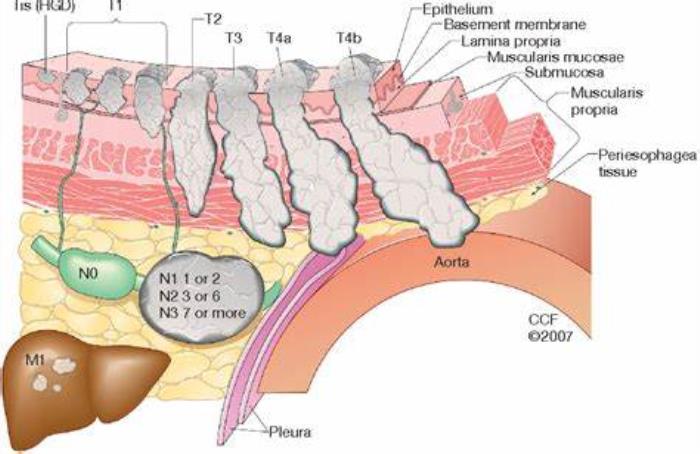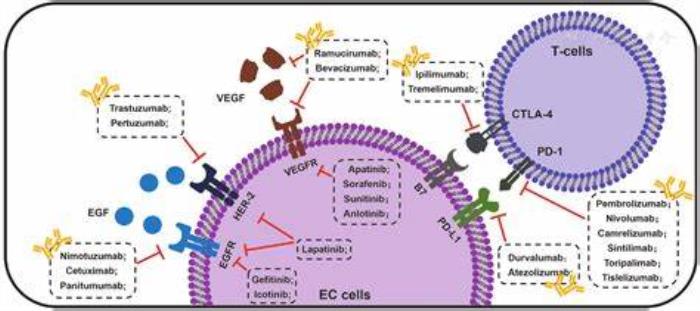Esophageal cancer is a malignancy that affects the esophagus, the tube that carries food from the throat to the stomach. The survival rates for esophageal cancer vary significantly based on several factors, including the stage of the disease at diagnosis, the patient's overall health, and the treatment options available. Understanding these survival rates is crucial for patients, families, and healthcare providers in making informed decisions regarding treatment and care.
Medical disclaimer: This content is for general awareness and does not replace a doctor’s consultation. For diagnosis or treatment decisions, consult a qualified specialist.
Types of Esophageal Cancer and Their Impact on Survival Rates
The two main types of esophageal cancer are adenocarcinoma and squamous cell carcinoma. Adenocarcinoma is more common in Western countries, while squamous cell carcinoma is prevalent in Asia and Africa. The type of cancer significantly influences survival rates, with adenocarcinoma generally having a better prognosis due to advancements in treatment.
Understanding Staging of Esophageal Cancer
The stage of esophageal cancer at diagnosis plays a critical role in determining survival rates. Staging ranges from Stage 0 (carcinoma in situ) to Stage IV (advanced cancer). Early-stage cancers typically have higher survival rates compared to late-stage cancers, where the disease may have spread to other organs.

Factors Influencing Survival Rates in Esophageal Cancer
Several factors influence the survival rates of esophageal cancer patients, including age, gender, overall health, and tumor characteristics. Younger patients and those with fewer comorbidities tend to have better outcomes. Additionally, the presence of specific genetic markers can also impact prognosis.
Statistical Survival Rates for Esophageal Cancer
According to recent data, the 5-year survival rate for esophageal cancer is approximately 20%. However, this rate varies significantly based on the stage at diagnosis. For localized disease, the 5-year survival rate can be as high as 45%, while for metastatic disease, it drops to around 5%.
Importance of Early Detection in Esophageal Cancer Survival Rates
Early detection of esophageal cancer is vital for improving survival rates. Regular screenings and awareness of symptoms, such as difficulty swallowing and unexplained weight loss, can lead to earlier diagnosis and treatment, significantly enhancing the chances of survival.
Role of Treatment Modalities in Esophageal Cancer Survival
Treatment options for esophageal cancer include surgery, radiation therapy, and chemotherapy. The choice of treatment depends on the cancer stage and patient health. Effective treatment can improve survival rates and quality of life, making timely intervention crucial.
Impact of Surgical Intervention on Survival Rates
Surgical resection, or esophagectomy, is often the most effective treatment for localized esophageal cancer. Patients who undergo surgery may experience significantly higher survival rates, particularly if the cancer has not spread beyond the esophagus.
The Role of Chemotherapy and Radiation in Esophageal Cancer
Chemotherapy and radiation therapy are often used in conjunction with surgery, either as neoadjuvant (before surgery) or adjuvant (after surgery) treatments. These modalities can shrink tumors and eliminate residual cancer cells, thereby improving overall survival rates.
Advancements in Targeted Therapy for Esophageal Cancer
Recent advancements in targeted therapies and immunotherapy have shown promise in improving survival rates for esophageal cancer patients. These treatments focus on specific cancer cell mechanisms, offering more personalized and effective options for patients.

Clinical Trials and Their Importance in Esophageal Cancer Treatment
Participation in clinical trials can provide patients access to cutting-edge treatments and therapies that are not yet widely available. These trials are essential for advancing our understanding of esophageal cancer and improving survival rates through innovative approaches.
Psychosocial Factors Affecting Survival in Esophageal Cancer Patients
The psychosocial well-being of esophageal cancer patients can significantly impact their survival rates. Factors such as support systems, mental health, and quality of life play crucial roles in treatment adherence and overall outcomes. Addressing these factors is essential for comprehensive care.
Nutrition and Its Role in Esophageal Cancer Survival Rates
Proper nutrition is vital for esophageal cancer patients, especially those undergoing treatment. A balanced diet can help maintain strength, support recovery, and improve overall survival rates. Patients should consult with nutritionists for tailored dietary plans.
Post-Treatment Monitoring and Its Importance for Survival
Regular post-treatment monitoring is crucial for detecting any recurrence of esophageal cancer. Follow-up appointments, imaging tests, and symptom assessments can help manage complications and improve long-term survival rates.
Survivorship and Quality of Life After Esophageal Cancer
Survivorship programs focus on the long-term health and quality of life of esophageal cancer survivors. Addressing physical, emotional, and social needs can enhance the overall well-being of patients, thereby positively influencing their survival outcomes.
Global Variations in Survival Rates for Esophageal Cancer
Survival rates for esophageal cancer can vary significantly across different regions globally. Factors such as healthcare access, availability of treatment options, and public awareness contribute to these disparities, impacting overall patient outcomes.
Role of Endoscopic Procedures in Esophageal Cancer Management
Endoscopic procedures play a vital role in diagnosing and managing esophageal cancer. Role of endoscopic procedures in esophageal cancer management explores how techniques like endoscopic ultrasound and mucosal resection offer minimally invasive options for early detection and treatment, improving patient outcomes and reducing recovery times.
The Benefits of Minimally Invasive Surgery for Esophageal Cancer
Minimally invasive techniques have revolutionized esophageal cancer treatment. The benefits of minimally invasive surgery for esophageal cancer outlines how these procedures reduce surgical risks, minimize pain, and speed up recovery, making them a preferred choice for eligible patients.
Future Directions in Esophageal Cancer Research and Survival Rates
Ongoing research into esophageal cancer aims to identify new biomarkers, improve treatment protocols, and enhance early detection methods. These advancements are crucial for increasing survival rates and improving the prognosis for future patients.
Best Esophageal Cancer Treatment in India
The Best Esophageal Cancer Treatment in India involves advanced techniques such as minimally invasive esophagectomy, chemotherapy, and radiation therapy for effective cancer management.
Best Esophageal Cancer Specialists in India
The Best Esophageal Cancer Specialists in India have extensive experience in treating esophageal cancer, offering tailored treatment plans and compassionate care to achieve optimal outcomes.
FAQs Regarding Survival Rates and Esophageal Cancer
What are the main symptoms of esophageal cancer?
Common symptoms include dysphagia (difficulty swallowing), weight loss, chest pain, and persistent cough. Early recognition of these symptoms can lead to timely diagnosis and improved survival rates.
How is the stage of esophageal cancer determined?
The stage is determined through a combination of imaging tests, biopsies, and clinical evaluations. Accurate staging is crucial for predicting survival rates and planning appropriate treatment.
What lifestyle changes can improve survival rates for esophageal cancer patients?
Adopting a healthy lifestyle, including a balanced diet, regular exercise, and avoiding tobacco and excessive alcohol, can positively influence survival rates and overall health.
Are there any new treatments available for esophageal cancer?
Yes, advancements in targeted therapies and immunotherapy are being explored, offering new hope for improving survival rates in esophageal cancer patients.
What role does family support play in esophageal cancer survival?
Family support is crucial for emotional well-being and treatment adherence, which can significantly impact survival rates. A strong support system can enhance coping strategies and improve overall outcomes.
Discover the Best Oncologists and Cancer Hospitals in India
When it comes to cancer treatment, finding the right specialist and hospital can make a significant difference in the outcome. In this blog, we have compiled a list of the top oncologists and cancer hospitals across major cities in India, ensuring that you have access to the best care available.
Top Oncologists in Major Cities
For those seeking expert oncologists, we have identified the best specialists in key cities:
Leading Cancer Hospitals
In addition to finding the right specialist, choosing the right hospital is crucial for comprehensive cancer care. Here are the top hospitals in major cities:
Get more indepth information on Cancer treatments and their costs
Conclusion
Finding the right oncologist and hospital is the first step in your cancer treatment journey. Explore the links above to learn more about the top specialists and hospitals in your area.
This page provides comprehensive information on managing swallowing difficulties (dysphagia) in patients with esophageal cancer. It covers causes, symptoms, diagnostic methods, and various treatment options, including dietary modifications, swallowing therapy, and medical interventions. Managing Swallowing Difficulties in Esophageal Cancer Patients
This page explores the latest advancements in esophageal reconstruction following cancer surgery. It highlights innovative surgical techniques, improved postoperative care protocols, and emerging technologies aimed at enhancing patient outcomes and quality of life. Advances in Esophageal Reconstruction After Cancer Surgery
This page discusses the impact of esophageal cancer on both breathing and digestion. It covers how the cancer can cause symptoms such as difficulty swallowing (dysphagia), chest pain, and respiratory issues, as well as the effects on nutritional intake and overall quality of life. Esophageal Cancer and Its Impact on Breathing and Digestion